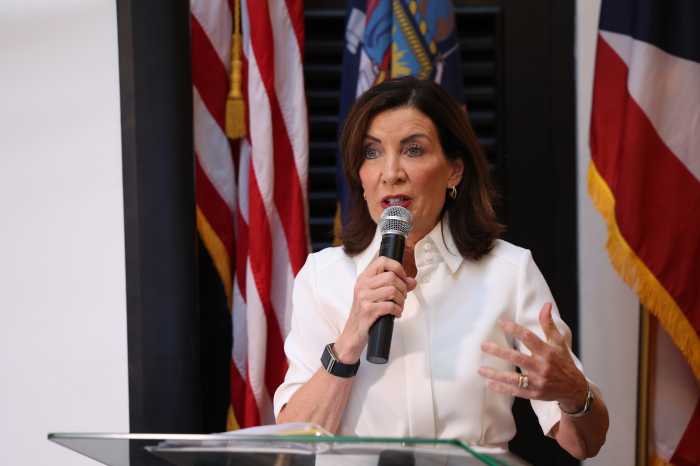A real Hart-Warmer; a soap diva’s soiree; Catholic accountability
“This is the model for all such tributes,” Dan Fortune, the publicist, said of “Hart to Hart,” the Metropolitan Opera Guild salute to Kitty Carlisle and her late husband, writer/director Moss Hart on November 21. Indeed, the lengthy evening was every bit as professional and elegant as Kitty herself. Orson Bean, her co-star on the game show, “To Tell the Truth,” proved the wittiest speaker, recalling how people tuned in so that they could “hate Dorothy Kilgallen and love Kitty Carlisle.” A reel of clips from the show (“which proves that Kitty did actually change her hairstyle over the years”) was highlighted by an episode in which Bette Davis appeared, with two impersonators (one of them Kaye Ballard, doing a wickedly spot-on impersonation).
Robert Goulet was his usual, slightly bizarre, showbiz self, so innately cheesy that he should perhaps considering changing his name to Robert Gouda. He recalled jokily kissing Richard Burton during rehearsals for “Camelot” (“which made a couple of chorus boys fall down”) and then spoke-sang, not his Lancelot’s famous “If Ever I Would Leave You,” but King Arthur’s “How to Handle a Woman.” Audra McDonald courageously performed “The Man That Got Away” (from “A Star is Born,” which Moss scripted), saying, “Only for Kitty would I do this beneath a huge picture of Judy Garland!” Her reading was impassioned but somewhat undone by accompanist Steven Blier’s arty noodling.
At the finale, host Beverly Sills admitted she was ready for bed, at which point co-host Julie Andrews proved she can indeed sing again by warbling, “Bed, bed, I couldn’t go to bed,” as she was joined by McDonald, Denyce Graves, Sylvia McNair, Celeste Holm, Rosemary Harris, Jane Alexander, Anna Moffo and Kitty, herself, all joining in on “I Could Have Danced All Night,” an enchanting end to an enchanting evening.
Soap opera star Eileen Fulton proved herself the most generous, gracious gal in town by hosting a dinner party at the Friars’ Club to celebrate the completion of her film, “Sunsetters,” an engaging trifle about, of all things, a philosophy camp in Costa Rica, directed by Marynell Maloney. Fulton, who has been on “As the World Turns” for nearly 50 years, and who I like to call by her character’s name — Lisa Miller Hughes Eldridge Shea Colman McColl Mitchell Grimaldi Chedwyn – looked divine in black cocktail mufti, designed by the great Miss Frankie – and enthused about her film role, a lesbian.
“Oh, honey, I have so many gay friends, it’s not even funny,” she said. “And not one could recognize me when they saw the pictures of me, all butched-out in jeans and work shirts. The Costa Rica location was beautiful, but rough, but that didn’t faze me. Neither did the steamy kiss I shared with this young Russian actress, Olga Shutaleva.” The adorable Corey Carthew, who I congratulated in the men’s room, steals the film, as the rambunctious “Richard Hatch/Survivor” member of the camp. “Wow, I got naked for you [in the film] and then we peed together,” he said. “What a night we’re sharing!”
Following a recent performance of the powerful play “Sin,” which deals with child sexual abuse in the Catholic church, an absorbing “Talk Back” session was held with the audience and a panel consisting of, among others, Carlos Martinez from Voice of the Faithful (a Catholic group devoted to addressing this issue, www.votf.org), a priest who works with victim/survivors and a woman who spoke about the prevalence of nun abuse, which is every bit as much of a reality as that among priests.
“At age 17, I was sexually abused by a nun on a consistent basis in my senior year,” she told me. “It was an all-girls academy of 400, where everybody knew everything. You just kind of went through the motions of going to school. It’s only after it stops that you realize, ‘Ohmigod, I can’t deal with it.’ You feel shame and guilt and you lose your voice. I stayed quiet for a long time, and then moved through and beyond it, without doing any of the therapeutic work until nine years later. I suffered depression, cut myself, became anorexic and went through a lot before I learned it wasn’t my fault. Victims always think, ‘What did I do to deserve this? I can’t say anything that will shame my parents.’ But I have been one of the lucky ones: my parents and husband, who I told about this four years after we married, have been very supportive. Can you imagine: I had to go to my husband. It was a long recovery for me and for him, and my parents. They had always questioned what was going on without really knowing anything, and begged for this nun to be kept away from me. They didn’t know I was being abused but just didn’t like what they saw. That nun is no longer teaching and no longer a member of the order.”
The session revealed myriad examples of suppression by the church (which was referred to as “the richest public relations firm in the world”), ostracism, harassment and unveiled threats of violence to these courageous ones determined to keep the issue in public awareness and help the tens of thousands of victims affected by this, both in the past and the present.
A superb cast does all they can to put over Stephen Sondheim’s “Pacific Overtures” at Studio 54. Their spirit and talent largely carry the first half of this overly ambitious, too-schematic work about the 19th century opening of Japan to the West, but there’s not much they can do to save the second act. “Please Hello!” that endlessly “clever” xenophobic number involving the foreign ambassadors, never really worked in any of this show’s incarnations and the gigantic, puppet-like figure standing in for Commodore Perry and the big-nosed, brillo-haired caricatures of the foreign minions are tiring. They merely added a further static element to an often brilliant production that was already unnervingly tableau-riddled to begin with.
The set and costume designs were mostly exquisite (apart from the final number), but a lot more imaginative stage magic was needed beyond those constantly configuring panels. As for the finale, “Next,” always a problematical number, well, it never seemed more ridiculous, with its hectoring snippets of Japanese current events (“Hideki Matsui was the top batter of the New York Yankees’ last season!”), with the cast outfitted in Vegas S/M glitz, carrying on like the Backstreet Boys. This brings up the choreography of director Amon Miyamoto, which could kindly be described as less than inspired.
Telly Leung, in a variety of roles, has proved himself one of the brightest lights on Broadway, a physically stunning triple-threat, possessed of a truly glorious voice. Michael K. Lee brought a lovely tenor and as much humanity as he could muster in the sketchily wrought central character of Kayama, the samurai dealing with modernity. Francis Jue effectively made the most of the comic whores’ song, “Welcome to Kanagawa,” but I prefer a less obvious, more traditionally Japanese take on this number, which was so matchlessly performed by Thomas Ikeda in the 1984 revival.
Ironically, although this production originated in Japan, under Miyamoto, it seemed the least “Japanese,” most “Broadway” rendition of it I have ever seen. It should be noted that Asians not only do not all look alike, nor do they all behave alike, and while one may appreciate the care with staging an all-Asian cast, certain innate, ethnic traits do distinguish Chinese or Filipinos, say, from Japanese, especially historically. For the way he grounded the show in a specifically Japanese ethos, the gruff, Toshiro Mifune-like manner of Mako, who played the role of the Narrator on Broadway in 1976, was rather sorely missed here. B.D. Wong, although charming, seemed a tad over-parted in the role, but, for me, the true star of the cast was Alvin Y.F. Ing. As the Shogun’s poisonous mother, a role he originated on Broadway in 1976, and as the Old Man who witnessed Perry’s actual landing, he has a joyously tuneful, charismatic presence. When he, Leung, Wong, and Evan D’Angeles joined voices in “Someone in a Tree,” they briefly achieved the true magic this production was striving for, and made you understand exactly why this is Steven Sondheim’s stated personal favorite of all of his songs.
At the Sunday matinee (November 28) I caught, the strenuousness of this very physical show had caught up with its cast: Jue had to be replaced in the “Please Hello!” number, while talented Hoon Lee, who hurt his back, was out completely. More’s the pity, as every critic in town, from Ben Brantley to John Simon, had decided to catch this very performance.
Contact David Noh at Inthenoh@aol.com.




































